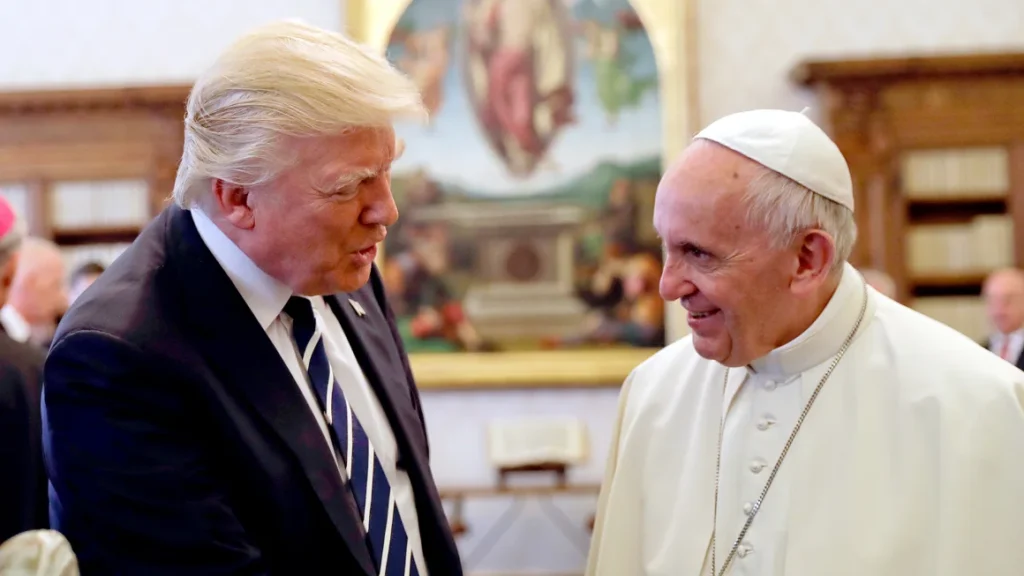Student Opinion: From Feud to Firestorm – Pulpit vs. Politics in the Vatican-Trump Immigration Clash

By Francesca Jonica
This is an independently submitted op-ed for our Quill section. Views and statements made in this article do not necessarily reflect the opinions of The Tower.
Over the past few weeks, a heated debate has erupted between the Trump administration and the Vatican, centering on immigration funding and the role of religious institutions in government-funded social services. What began as a dispute between Vice President JD Vance and New York Cardinal Timothy Dolan has since escalated into a broader ideological clash between the White House and the Catholic Church. The controversy has led to political statements from both sides, highlighting deep tensions over immigration policy, government spending, and the separation of church and state.
At the heart of the dispute is the question of whether the U.S. Conference of Catholic Bishops (USCCB) and the Vatican should be receiving government funds to assist in the resettlement of undocumented immigrants. Vice President Vance, a practicing Catholic, has been vocal in his criticism. He accused the USCCB of benefiting financially from federal funding while simultaneously limiting immigration enforcement efforts at certain church-run facilities. In a recent statement, he remarked that Catholic bishops should “look in the mirror” when accepting over $100 million in government funding for migrant resettlement.
Cardinal Dolan strongly refuted these claims, calling Vance’s remarks “scurrilous” and “very nasty.” He has emphasized that the Church does not profit from these programs and, in fact, often loses money in the process. According to Dolan, the USCCB’s involvement in immigration assistance is motivated purely by humanitarian and religious obligations rather than financial gain. This raises an important question: should faith-based organizations rely on taxpayer money for charitable endeavors, or should they be independently funded through private donations?
The feud between Vance and Dolan coincided with a significant statement from Pope Francis regarding immigration. Just days after the controversy began, the Pope condemned the Trump administration’s stance on immigration, declaring that Christians should welcome migrants and that anyone who builds walls to keep them out is not a Christian. This statement drew sharp criticism from American conservatives, with many arguing that it was hypocritical for the Vatican to criticize border security while being protected by walls itself.
Tom Homan, a lifelong Catholic and the acting director of Immigration and Customs Enforcement (ICE), responded directly to the Pope’s remarks, “If Pope Francis doesn’t like walls, how about he takes down the walls around his house in Vatican City?” I have to say, I agree with Homan on this point. The Vatican, which maintains its own strict security and is heavily guarded, should lead by example. It’s one thing to call for compassion and assistance for migrants, but it’s another to criticize a nation’s right to enforce its immigration laws while receiving funding from that nation.
Beyond the politics, the core issue remains: should the Catholic Church and the USCCB accept government money for immigration assistance? Theologian Dr. Taylor Marshall argues that this financial dependency compromises the Church’s mission and autonomy. He believes that by taking federal funds, the USCCB aligns itself too closely with political interests, weakening its spiritual authority. Instead, he suggests the Church should rely on private donations from the faithful to fund its charitable work.
I agree. If the Church’s mission is to provide aid out of religious and moral duty, it should not depend on government support. Relying on taxpayer dollars invites scrutiny and raises church-state separation concerns. Government-funded programs risk incentivizing more undocumented migration, and thus more spending on migrant support, creating an endless cycle where taxpayers continue footing the bill. The Church has a vast global network and could raise sufficient private funds without relying on public money.
Defenders of the USCCB’s approach argue that immigration is a humanitarian crisis requiring large-scale solutions and that government partnerships enable the Church to help more people than private donations alone could. But I find this reasoning to fall short. If the Church truly believes in its mission, it should not require government funding to do its work. Taking federal money only entangles the Church in politics and accountability issues.
Pope Francis’ stance on immigration adds another layer of contradiction. While he preaches open borders, Vatican City remains fortified with walls dating back to the 9th century. I agree with Tom Homan—if Pope Francis opposes walls, perhaps he should take down his own first. Condemning border security while living behind high walls undermines his message and fuels skepticism.
The debate between Vice President JD Vance and Cardinal Dolan has become part of a larger battle between faith and politics, government funding and religious independence. The Trump administration’s criticism of the USCCB raises valid concerns about financial transparency, while the Vatican’s defense of migrant aid underscores its commitment to humanitarian work. However, as a student observing this debate, I believe the Church should step away from government money altogether. If it wants to help migrants, it should do so without relying on taxpayer dollars.
This issue is far from settled, and the divide between the Trump administration and the Vatican suggests the debate will continue. But one thing is clear: the Church cannot have it both ways. It must choose between true independence or continued entanglement in political disputes.





